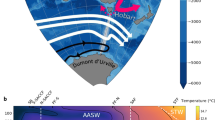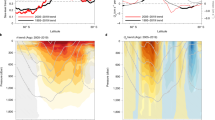Abstract
UP to the publication of this work by Prof. Mohn, our knowledge of the diurnal meteorological phenomena of this important part of the ocean was nearly altogether a blank. The interesting results here detailed are deduced from three series of hourly observations made during the Norwegian Expeditions in the summers of 1876, 1877, and 1878, which Prof. Mohn organised and carried out with a skill and a completeness that leave nothing to be desired. The new facts thus brought before us largely extend our knowledge of the physics of this portion of the North Atlantic.
This is a preview of subscription content, access via your institution
Access options
Subscribe to this journal
Receive 51 print issues and online access
$199.00 per year
only $3.90 per issue
Buy this article
- Purchase on Springer Link
- Instant access to full article PDF
Prices may be subject to local taxes which are calculated during checkout
Similar content being viewed by others
References
"The Norwegian North Atlantic Expeditions 1876–78. Meteorology." By H. Mohn . With 13 woodcuts and 4 plates. (Christiania, 1883.)
Rights and permissions
About this article
Cite this article
BUCHAN, A. The Meteorology of the Arctic and Subarctic Portions of the Atlantic Ocean 1 . Nature 28, 398–399 (1883). https://doi.org/10.1038/028398b0
Issue Date:
DOI: https://doi.org/10.1038/028398b0
Comments
By submitting a comment you agree to abide by our Terms and Community Guidelines. If you find something abusive or that does not comply with our terms or guidelines please flag it as inappropriate.



